Program - Practical information - Required Reading and Optional Breakfast seminar - Research seminars - PhD seminars
Theme
Rhetoric, or the art of persuasion, is a central aspect of all authoritative texts. This seminar will investigate methods of textual persuasion from antiquity to the modern era, shedding light on rhetorical practices from the perspectives of different disciplines. With lectures from internationally recognized experts in the humanities, law, and theology, participants will have the opportunity to discuss a diverse range of interdisciplinary perspectives on rhetorical practices and analysis, as well as present and get feedback their own dissertations-in-progress.
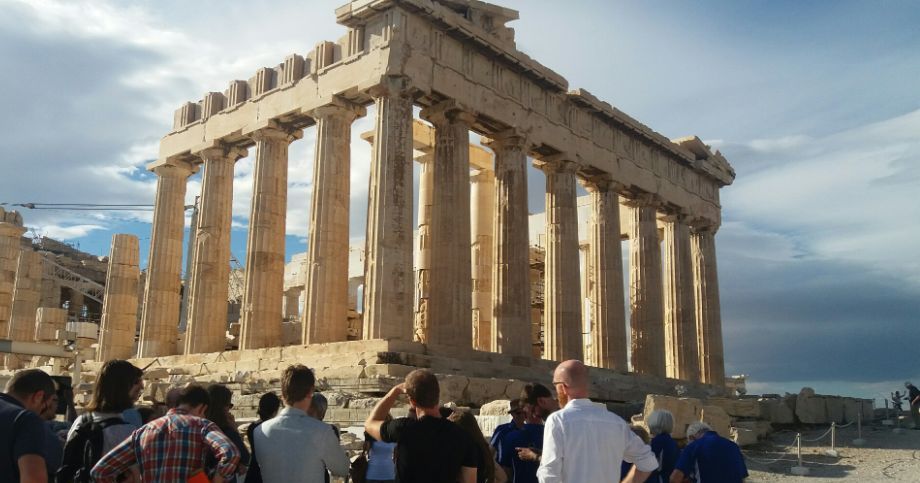
Program
-
Field trip with Prof. Jorunn Økland to Corinth
-
Program (.pdf)
Practical information
- The application deadline was December 15.
- The seminar will take place at the Norwegian Institute at Athens
- The seminar start March 18 (morning) and ends March 21 (evening).
- Lodging at Acropolis View Hotel.
- The seminar equals 5 ECTS
Required reading and optional breakfast seminar
Breakfast seminar
Participants often meet before the seminar, at their institutions, to discuss one or more of the texts from the required reading list. ATTR support these kinds of breakfast seminars / reading groups and sponsor coffe/tea/meal.
A breakfast seminar will be arranged at the University of Oslo, to read one of the required texts: Hawhee, Debra. “Zoostylistics after Aristotle,” Chapter two of Rhetoric in Tooth and Claw: Animals, Language, Sensation. Chicago: University of Chicago Press, 2017, p. 37-69. (.pdf is available)
Time/Place: March 14, 09:00-10:00. Room: 214, Domus Theologica
If you would like to arrange a reading group / breakfast seminar at your institution, please contact the ATTR administration.
Research seminars
 International guest speaker: Debra Hawhee
International guest speaker: Debra Hawhee
We are proud to present our special guest speaker for this seminar, Professor Debra Hawhee.
She is McCourtney Professor of Civic Deliberation at Penn State University. She studies and teaches rhetoric, the art of communication. She writes histories of rhetorical theory that draw out rhetoric's other-than rational dimensions—feeling, bodies, sensation, imagination.
Prof. Hawhee will give a lecture on "Rhetoric’s Polychrome History".
For more information, see www.debrahawhee.com
All lecturers
(In order of appearance)
Jorunn Økland. Professor, Director of the Norwegian Institute at Athens
Eleni Volonaki. Professor, Department of Philology, University of Peloponnese
Debra Hawhee. Professor, English Department, The College of the Liberal Arts, Penn State University
Christoph Markschies. Professor, Anscient Christianity, Humboldt-Universität zu Berlin
Hans Petter Graver. Professor, Department of Private Law, Faculty of Law, University of Oslo.
Abstracts
"Means of Persuation in Greek Oratory"
Professor Eleni Volonaki
 Greek oratory plays a vital role to the private and public life of classical Athens, since it is employed in all forms of power, executive, political and legislative. Athenian citizens who had rhetorical skills delivered speeches at the Assembly and the Boule, at the Athenian courts and at festivals or public burials and ceremonies. According to Aristotle there are three kinds of orations, the forensic, the deliberative and the epideictic speeches. Forensic oratory aims to persuade the judges to convict or acquit the accused, whose verdict is final and unchangeable, and it refers to the past since, it involves offences that have already been committed. Deliberative oratory aims to advise the Athenian assembly to approve or disapprove a policy or any decision that concerns the Athenian public life in external and internal matters; it refers to the future and needs to advise about what is in the best interests of the city or dissuade the citizens from any harmful action or decision. Finally, epideictic oratory constitutes a form of praise or slander and involves the present; the most characteristic form of epideictic oratory is to be found in the funeral orations, which are delivered during the burial of the dead and praise not only the virtues and deeds of the dead men but also the history and constitution of the polis.
Greek oratory plays a vital role to the private and public life of classical Athens, since it is employed in all forms of power, executive, political and legislative. Athenian citizens who had rhetorical skills delivered speeches at the Assembly and the Boule, at the Athenian courts and at festivals or public burials and ceremonies. According to Aristotle there are three kinds of orations, the forensic, the deliberative and the epideictic speeches. Forensic oratory aims to persuade the judges to convict or acquit the accused, whose verdict is final and unchangeable, and it refers to the past since, it involves offences that have already been committed. Deliberative oratory aims to advise the Athenian assembly to approve or disapprove a policy or any decision that concerns the Athenian public life in external and internal matters; it refers to the future and needs to advise about what is in the best interests of the city or dissuade the citizens from any harmful action or decision. Finally, epideictic oratory constitutes a form of praise or slander and involves the present; the most characteristic form of epideictic oratory is to be found in the funeral orations, which are delivered during the burial of the dead and praise not only the virtues and deeds of the dead men but also the history and constitution of the polis.
The present lecture will present the means of persuasion used for each separate form of oration, the types of proofs used for forensic speeches, the themes of advice for deliberative speeches and the content of praise for epideictic speeches. Apart from the theoretical approach and presentation of all various means of persuasion, a selection of texts from oratorical speeches throughout the classical period will also be examined to demonstrate the convergence and digression of practice from theory. As will be shown, each speech constitutes a distinct case with reference to the circumstances of the deliverance, the time and the period, and the persons involved; therefore, there is a flexibility and differentiation in the use of the rhetorical means of persuasion in order to fulfil the aims of the speaker at the time. Furthermore, there is a development and evolution in the use of rhetorical means of persuasion which is not associated only with the evolution of the art of rhetoric throughout the centuries but also with changes that occurred in the political, social and religious context, within which speeches were composed and publicly delivered. Rhetoric not only constitutes an art of speech to deliver in public, but also a theoretical weapon to study and examine in philosophical schools, especially toward the second half of the fourth century BC.
"Words of delight. Christian rhetoric and monastic seduction from Augustine to Bernard of Clairvaux"
Assoc. Professor Line Cecilie Engh 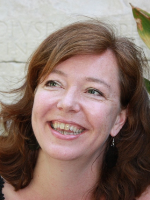
In this lecture we shall discuss the Christianization and later ‘monastization’ of Roman rhetoric. Eloquence, Augustine held, could and should be legitimately used by the Christian teacher and preacher to capture an audience. In De doctrina christiana Augustine rehabilitated Ciceronian rhetoric by placing it in the service of Christian faith as a means to persuade, to delight, and to teach the truth of Scripture. Augustine’s text formed an essential part of the monastic curriculum, along with texts by patristic authors such as Ambrose, Jerome, Cassian, Cassiodorus, and Gregory – each with a solid rhetorical education. The monks, far from killing off rhetoric, further developed on its Christianized telos. In the medieval cloisters, this strand of rhetoric, a ‘monastic rhetoric,’ in Mary Carruthers’ phrasing, was turned into a programme of spiritual pedagogy – its aim the formation of a new Christian people (Carruthers, 1998).
Although monastic rhetoric was less concerned with persuasion and the oral delivery of speeches (actio) than classical rhetoric and more concerned with written composition (inventio) and mnemotechnical meditation, certain basic aspects of Greco-Roman rhetoric persisted in its translocation from the forum to the claustrum. I would like to emphasise two such aspects. First, monastic rhetoric, like classical rhetoric, was essentially a multimodal form of communication, characterized by a mixed use of visual and verbal media. Second, monastic rhetoric maintained and even amplified on the role of imagination (imaginatio) from the Roman rhetorical tradition, especially the writings of Cicero and Quintilian (Stock, 2017).
Unlike earlier writers such as Augustine, Bernard of Clairvaux does not engage in explicit, second-order discussions of rhetoric. Instead, we have to tease suppositions out of his texts; we shall attempt to do so in the latter part of the lecture, by close readings of Bernard’s sermons. His rhetorical skills and persuasive powers gained him the epithet ‘the honey-mouthed doctor’, and are emphasized already in the vita prima (his hagiography, begun while he was still alive). Bernard’s primary audience were Cistercians or aspiring Cistercians: a spiritual elite who lived the physically and mentally strenuous life demanded by the Cistercian interpretation of Benedict’s Rule. I interrogate a rhetorical strategy that sought to persuade the monks as well as aspiring novices that somehow their sacrifice was worth it. Expanding upon Augustine’s notion that human cognition finds added pleasure in finding truth through non-literal interpretation, Bernard attempts – I argue – a more radical emotional/cognitive seduction of his audience to lead them towards a spiritual understanding, towards God.
"Rhetoric’s Polychrome History"
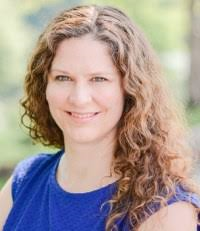 Professor Debra Hawhee
Professor Debra Hawhee
In his 1964 meditation on Chaucer’s relationship to “the Rhetoricians,” James J. Murphy appends this footnote to his brief but tantalizing discussion of “the terms color or colour and colours of rethorike”: “The tangled history of these terms remains to be written” (9n4). In the intervening years, a few scholars have offered treatments of the phrase “colors of rhetoric” (in addition to Arbusow, whom Murphy cites; see in particular Roller, Bradley, Carruthers, Fairweather, Lévy, and Camargo), though most describe it, as does George Kennedy, as the figure for figures.
This lecture will dig more deeply into rhetoric’s relationship to color, seeking connections to the vibrant material worlds of ancient pigments and polychrome statues and monuments, which have been the focus of renewed attention given the advancement of investigative techniques for revealing trace pigment combinations. A sturdy starting point for figuring out what this new work means for the art of rhetoric would seem to be discussions of chrōma (color) and painting in sophistic discourse as well as in Plato’s dialogues featuring the sophists (Sophist, Gorgias and elsewhere).
This lecture, then, will present a new pre-history of colors in rhetoric by bringing together findings about ancient visual culture and polychromy with readings of passages in Greek texts where painting and rhetoric turn up together. The investigation will illuminate rhetoric’s constitution by attention and imagination while also inviting discussion of interpretive scholarly methods more generally.
"Narrative Ethics"
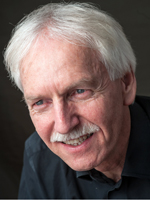 Professor Jakob Lothe
Professor Jakob Lothe
Emphasizing the rhetorical aspect of narrative ethics, this lecture will primarily discuss two narratives: Olga Horak’s first-person narrative from the Holocaust and W. G. Sebald’s novel Austerlitz (2001). While Sebald is an internationally acclaimed author, Horak is a Holocaust survivor whose story, orally transmitted to Jakob Lothe in Sydney in 2013, is presented as written text in Time’s Witnesses: Women’s Voices from the Holocaust (2017). Even though these narratives are very different, both are possessed of an ethical dimension that not only highlights the authors’ sense of ethical responsibility, but also that of the reader. The lecture argues that, first, even in narratives as different as these two, the author’s sense of ethical responsibility is closely linked to the reader’s ethical obligation; second, as an integral part of the reader’s interest in and engagement with the narrative text, this kind of obligation is generated and shaped by the narrative as rhetoric; and, third, two of the most important constituent elements of this kind of form – that is, elements of narrative form possessed of a distinctly ethical dimension – are narrator(s) and characters, and the interplay of both with the author on the one hand and the reader on the other.
"Authorization of Texts and the Rhetoric of Commentaries in Antiquity – A Comparative Approach"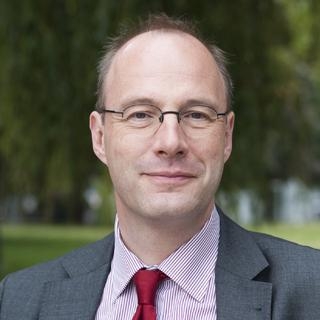
Prof. Christoph Markschies
Pagan, Jewish and Christian authors of Commentaries used different rhetorical strategies to authorize their interpretations. The lecture will focus on catalogues, narrations, prologues and prayers/appeals God(s) and how such elements help to establish or to demolish authority. In the workshop some characteristic examples will be discussed (on the basis of English translations, but with a look to Greek texts too).
"Peeking Through the Keyhole: Using Narratives to Explain Legal Reason"
Prof. Hans Petter Graver
 To understand law and legal development we need a theory of institutions. But institutional theory is not enough. People are not just role-players, and the judge and other actors of the law not following the rules when they apply them. People act within institutions, shaping and reshaping them, within a social field that is in practice relatively independent of external dominations and pressures (Bourdieu 1987:816). Within this legal field, juridical authority is produced and exercised. The juridical field is constituted by formal and informal norms, and these norms create positions, enable and empower actors and form incentives. But the actors also compete about positions and results and about how to interpret and uphold the institutional norms. Their interaction is shaped both by power relations and organisation, and by actors strategically pursuing their interests within relational networks in which the actors participate. In these networks the actors communicate, they argue, persuade and tell stories. By this they determine the Law.
To understand law and legal development we need a theory of institutions. But institutional theory is not enough. People are not just role-players, and the judge and other actors of the law not following the rules when they apply them. People act within institutions, shaping and reshaping them, within a social field that is in practice relatively independent of external dominations and pressures (Bourdieu 1987:816). Within this legal field, juridical authority is produced and exercised. The juridical field is constituted by formal and informal norms, and these norms create positions, enable and empower actors and form incentives. But the actors also compete about positions and results and about how to interpret and uphold the institutional norms. Their interaction is shaped both by power relations and organisation, and by actors strategically pursuing their interests within relational networks in which the actors participate. In these networks the actors communicate, they argue, persuade and tell stories. By this they determine the Law.
A central part of the interaction is performed by actors communicating with each other. To understand institutions, we therefore need to use rhetorical theory to see how interaction between actors take place. The stories they tell and the arguments they use and are persuaded by is partly determined by the institutions within which they operate. But the stories also shape the institutions. In the communicative field of law, actors operate within a structure of formal and informal rules and norms. The rules and norms empower and constrain them but are also changed by the actors. Power and constraints are not only about norms of conduct and sanctions, but also to a large degree about values, knowledge and inclinations, in other words doxa and habitus. Doxa and habitus is often revealed by the stories people tell, the way they shape their narratives of facts and events. Narratives are therefore keyholes in through which we can peek to make what is tacitly taken for granted explicit.
PhD seminars
Seminar guide (.pdf)
Central to all ATTR seminars and summer schools are the PhD fellows’ own presentations of papers based on their dissertation work, with prepared responses by other PhD fellows.
Due to the interdisciplinary nature of ATTR, the focus of the discussions will be primarily on methodological matters and interdisciplinary insights.
The PhD seminars are important means to the ATTR learning goals:
- Writing and presentation skills: The seminars aim not only at providing a setting for constructive discussions relating to thesis work, but also at preparing the candidates for life after their dissertations. ATTR thus aims to hone students’ presentation and writing skills, skills that may be useful for development of research projects for which funding can be sought from, e.g., ERC and RCN.
- Methodology: The objective of ATTR is to create a venue where interpretive methodologies can be critically discussed, evaluated, and developed, so as to broaden the candidates’ perspectives and heighten the quality of their analyses.
- Networking: In all its activities, the creation of an interdisciplinary network of young scholars in order to ensure the highest possible academic quality of PhD education is a central goal of ATTR.
Academic Skills Workshop
"Cross - multi – inter – disciplinary subjects? Becoming and belonging in interdisciplinary PhD research"
With Eystein Gullbekk. University Librarian, The University of Oslo Library
In this seminar, we will familiarize ourselves with select views on interdisciplinarity. More importantly we will explore scholarly communication in a multi-disciplinary research environment. We will do this by case-based discussions of interdisciplinary communication.
PhD research has been depicted as a process of belonging and becoming. In interdisciplinary environments we may however experience a process of becoming without belonging. As the title suggests, interdisciplinarity is an ambiguous term. Roughly stated two overarching perspectives seem to exist. First, a dominating body of literature emphasizes the integration of different disciplinary perspectives (e.g. theories, methodological viewpoints, concepts, or even scholarly identities) as the decisive criteria for interdisciplinarity. Second, a smaller body of literature points out that interdisciplinary research implies the disassembling of disciplinary based perspectives. Both perspectives entail challenges to our scholarly identity/subjectivity in communication with others.
How does communication across disciplinary boundaries enable, inhibit or develop our scholarly voices and subjectivities? Whether emphasis is on integration or dismantlement of disciplinary voices, “published perspectives are largely those of well-established faculty or researchers” (Graybill and Shandas, 2010, p. 406). This leaves us with little guidance on how to approach our own interdisciplinary PhD research.
In this seminar we will explore interdisciplinary scholarly communication. We will first address the interdisciplinary scope and features of our own research and that of our fellow students in the research school. Second, we will explore how to communicate research across disciplinary boundaries. We will do this by discussing situations that activate questions regarding critical aspects of scholarly communication, such as
- multiple academic communities
- discipline specific discourses
- response across boundaries
- the transportability of concepts
- breakdown in communication
- publication channels
- literature search

